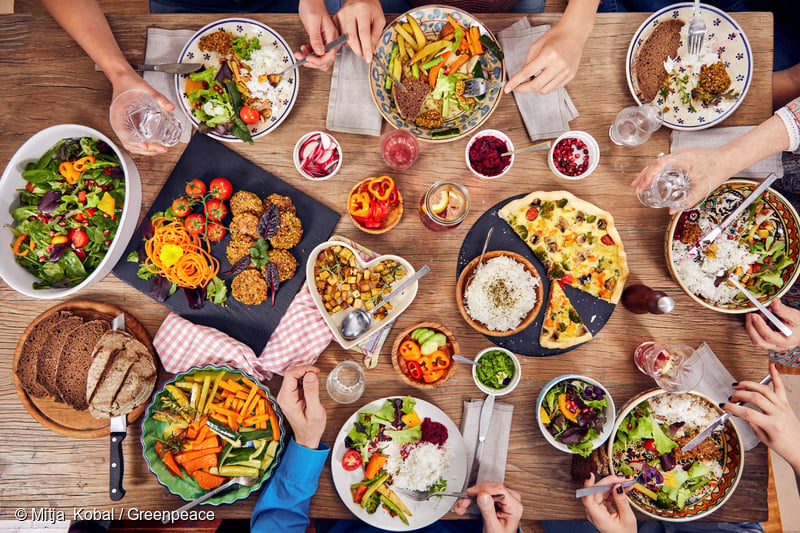Brussels – Meat consumption in the European Union should drop by 71% by 2030, and by 81% by 2050, to tackle farming’s contribution to climate breakdown, according to new analysis by Greenpeace. This would mean an average of no more than 460 grams of all types of meat leaving the slaughterhouse per person per week by 2030, and 300 grams in 2050, down from the current EU average of 1.58 kilograms per person per week.

Given that not all meat is ultimately sold or eaten, the actual amount of meat that people eat would be under 460 grams – probably less than the equivalent of three burgers per week. [1] The Lancet recommends that people eat no more than 300 grams of meat per week by 2050 as part of a balanced, sustainable diet.
Europeans consume around twice as much meat as the global average, and almost three times as much dairy. Figures for all EU countries, plus the UK, are available below. [2]
Greenpeace is calling on the European Commission to recognise the environmental impact of meat and dairy overconsumption, and to include reduction targets in its upcoming ‘Farm to Fork’ food strategy, due to be published on 25 March.
Greenpeace EU agriculture and forest campaigner Sini Eräjää said: “The science is overwhelming at this stage – overconsumption of meat and dairy is wrecking forests, crushing nature and heating the planet. The Commission wants to talk about ensuring healthy, affordable food produced in a sustainable way? Great idea, but that means it’s time to talk about reducing meat.”
The calculation of a reduction of global meat consumption to 24kg per person per year by 2030, and then further to 16kg per person per year by 2050, is based on levels that scientists say would ensure food security, while keeping global heating below 1.5°C.
Spain has the highest per capita meat consumption in the EU at over 100kg per person per year, requiring a 76% reduction by 2030. Bulgaria has the lowest consumption at 58kg per person annually, requiring a 59% drop by 2030.
The latest drafts of the Commission’s Farm to Fork plan recognise the EU’s overproduction and overconsumption of meat and dairy as a problem, but fail to propose measures to reduce them. Greenpeace’s demands for the Farm to Fork strategy are available here.
On 9 March, 3,600 scientists published an article condemning the EU’s common agricultural policy and its continued support of industrial animal farming. They recommended cutting payments for intensive animal farming to reduce greenhouse gas emissions.
Meat and dairy production contributes to climate breakdown and to the destruction of forests and other ecosystems. Animals like cows and pigs expel greenhouse gases directly and drive clearing of natural areas used for feed production.
Notes:
[1] Measuring consumption
Consumption is measured as the weight of carcasses leaving the slaughterhouse, including some bone. Depending on the type of meat, different amounts of the carcass will end up as final products in butchers’ shops or on supermarket shelves. Consumption figures also include food waste, for example unsold meat in retail. The actual amount that the average person eats will be less than what is counted as per capita consumption.
[2] Annual meat consumption per capita, and change needed to reach 2030 and 2050 goals
The annual per capita consumption data for meat is based on statistics for meat supply from the Food and Agriculture Organisation. The supply refers to the parts of the animals after slaughter that are technically edible, which are also known as “dressed carcass weight” or just “carcass weight”. The supply figures include waste (e.g. bones) before reaching retail and also food that goes unsold or uneaten.
| Country | 2017 consumption (kg) | Change to 2030 goal | Change to 2050 goal |
| Spain | 100.3 | -76% | -84% |
| Portugal | 94.1 | -74% | -83% |
| Poland | 88.7 | -73% | -82% |
| Germany | 87.8 | -73% | -82% |
| Austria | 87.2 | -72% | -82% |
| France | 83.0 | -71% | -81% |
| Czechia | 82.8 | -71% | -81% |
| Malta | 82.1 | -71% | -80% |
| Lithuania | 81.3 | -70% | -80% |
| Italy | 81.0 | -70% | -80% |
| Luxembourg | 80.1 | -70% | -80% |
| United Kingdom | 79.9 | -70% | -80% |
| Hungary | 79.7 | -70% | -80% |
| Ireland | 78.7 | -69% | -80% |
| Sweden | 77.1 | -69% | -79% |
| Finland | 76.7 | -69% | -79% |
| Slovenia | 76.4 | -69% | -79% |
| Netherlands | 75.8 | -68% | -79% |
| Croatia | 75.3 | -68% | -79% |
| Greece | 71.7 | -67% | -78% |
| Denmark | 70.8 | -66% | -77% |
| Latvia | 68.7 | -65% | -77% |
| Belgium | 65.8 | -64% | -76% |
| Romania | 63.9 | -62% | -75% |
| Estonia | 63.6 | -62% | -75% |
| Slovakia | 59.3 | -60% | -73% |
| Bulgaria | 58.3 | -59% | -73% |
| European Union | 82.6 | -71% | -81% |
Contacts:
Sini Eräjää, Greenpeace EU agriculture and forest campaigner: +32 (0)476 97 59 60, [email protected]
Greenpeace EU press desk: +32 (0)2 274 19 11, [email protected]
For breaking news and comment on EU affairs: www.twitter.com/GreenpeaceEU
Greenpeace is an independent global campaigning organisation that acts to change attitudes and behaviour, to protect and conserve the environment and to promote peace. We do not accept donations from governments, the EU, businesses or political parties. We have over three million supporters, and offices in more than 55 countries.
EU Transparency Register: 9832909575-41
